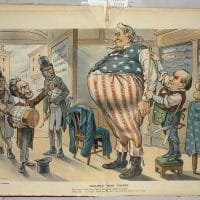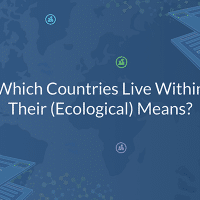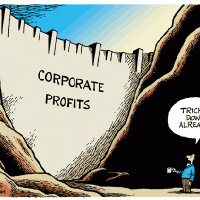-
South Africa’s business community has not stepped up honestly
Prof Patrick Bond from the University of the Witswatersrand (Wits) tells Business Day TV why the World Economic Forum, which held its annual Africa meeting last week, serves the interests of the ruling elite at the expense of communities.
-
Venezuela Government Accuses U.S. of Bankrolling Right-Wing Violence
The U.S. media’s treatment of the crisis in Venezuela is almost as craven as the corporate media in Venezuela itself. Articles like the following from TeleSur, and an article we recently posted from The Dawn, provide a much-needed corrective. As Marta Harnecker explained the April 2017 issue of MR (“A New Revolutionary Subject“): “The attacks […]
-
Puerto Rico’s $123 Billion Bankruptcy Is the Cost of U.S. Colonialism
Last week Puerto Rico officially became the largest bankruptcy case in the history of the American public bond market. On May 3, a fiscal control board imposed on the island’s government by Washington less than year ago suddenly announced that the Puerto Rico’s economic crisis “has reached a breaking point.” The board asked for the immediate […]
-
The Graveyard of Progressive Social Movements
When first encountering the “Impeach Bush” movement in 2007 I responded, almost flippantly, “why not impeach the system that gave us Bush?” Otherwise, I said, “we risk having someone in the White House who’ll make us long for Bush.” If prescient, my response was admittedly formulaic and evidentially deficient.
-
Which Countries Live Within Their (Ecological) Means?
The information contained within the 2017 edition of the National Footprint Accounts, and especially its elegant publishing platform, will be useful to critics of the status quo maintained by the major capitalist economic powers. To make sense of the data critically, however, one must go far beyond the explanation given below, as root causes are […]
-
Road to Trump’s Climate Change Hell Paved by Obama and Clinton
Monthly Review Press author Gerald Horne, Robert Pollin and Paul Jay discuss the debate within the Trump White House on whether to leave the Paris climate accords or just undermine them; and how this relates to the fight within the Democratic Party.
-
Slandering Populism
Populism properly understood is about popular and democratic opposition to the rule of the money power—to the reign of concentrated wealth. It emerged from radical farmers’ fight for social and economic justice and democracy against the plutocracy of the nation’s Robber Baron capitalists during the late 19th century. It was a movement of the left.
-
“To preserve peace in Venezuela, there’s no choice but to convene nationwide dialogue to reform the Constitution”
From El Salvador, where the meeting of Chancellors of the Community of Latin American and Caribbean States (CELAC) is being held, the Minister of Education and leader of the Presidential Commission of the Constituent National Assembly affirmed that one of his goals is to restore the principle of cooperation of the powers, because that’s the only way to preserve peace in the country given the opposition’s lack of will to dialogue.
-
Curiouser and Curiouser
A story worthy of a mystery author—or dramatist—has been hitting German headlines. It began when police at the Vienna airport in Austria arrested a first lieutenant of the German Bundeswehr army when he picked up a pistol hidden some weeks earlier in a bathroom. He denied it was his and was released. But his fingerprints somehow matched those of a refugee who had applied for German asylum two years earlier
-
The Promises and Limitations of Radical Local Politics
Read Michael D Yates’s informative interview with labor journalist Steve Early and Mike Parker, leader of the Richmond Progressive Alliance. The conversation focuses on both the benefits and limitations of engaging in radical politics at the local level.
-
What’s driving abnormal profit margins? Monopoly
Why is the cause of abnormally high corporate profit margins in the US. The phenomenon is amongst other things upsetting the standard notion that profits are mean reverting to historic averages. Jeremy Grantham (of the global investment management firm, GMO) puts the cause down to three other factors: increased monopoly power, increased political power and increased brand power.











